- Home
- J. D. Rhoades
The Killing Look Page 25
The Killing Look Read online
Page 25
“Not a burglar, lucky for you.” He bent over and picked at the knots that bound the man’s wrists behind him. “And who might you be?”
“My name’s Boyle. I’m a Pinkerton.”
“And a fine advertisement for the company you are.” Tremblay straightened up. “You’ve got these knots pulled so tight I can’t undo them. I’ll be back in a moment.” He went to the kitchen and came back with a sharp carving knife. Boyle had struggled to a sitting position, his back against the bed. Tremblay bent down and cut the ropes around his ankles, then the ones holding his wrists. Boyle stood, tottering unsteadily as the circulation came back in his feet, rubbing one wrist, then the other to get the blood flow back in those limbs.
“Where’s Hamrick?” Tremblay said. “And his wife?”
Boyle couldn’t meet his eyes. “I don’t know. Last time I saw Hamrick, he was in the library. She was upstairs.”
“You damned fool,” Tremblay snapped. “You were supposed to be guarding them. How’d you end up tied up on the floor of the servant’s room?”
“Bitch tricked me,” Boyle mumbled. “Brought me in here for a roll in the hay, then pulled a gun on me.” He touched the back of his head and winced. “But she didn’t have to clout me in the damn head.”
Tremblay shook his head in the disgust. “Idiot. Where’s the other one? The other man that was with you?”
Boyle looked sulky. “I don’t know. He was out back.”
They found the other man in the stable. He was still out, bound just as Boyle had been. Boyle cut him loose and sat him up. His head drooped, a line of drool running from his mouth. The back of his head was matted with blood. “Shit,” Boyle said. “We need to get him a doctor. Looks like he got hit a lot worse than I did.”
Tremblay didn’t answer. Both of the guards gone, the house empty. Where was John? He got up, leaving Boyle with his unconscious partner, and re-entered the house.
He found Hamrick lying in the doorway to the bedroom. There was no need to check the pulse or listen for breath. Half his head was blown away. Tremblay stood there for a moment, breathing hard, his mind racing. This had to be Cade’s doing. He saw a pistol lying a few inches away and picked it up. A plan was coming to him.
He carried Hamrick’s pistol downstairs. It would make a better scenario if John was unarmed when Cade shot him. And Tremblay intended to make sure that neither Cade nor Marjorie ever got a chance to tell a different story.
When he got back to the stable, the other man was awake, sitting up, his eyes looking vague and unfocused. There was a puddle of vomit on the stable floor next to him. Tremblay squatted down next to him. “What’s your name?”
“Sears,” the man mumbled.
“And were you the senior agent in this debacle?”
Sears blinked in confusion. “What?”
“Were you in charge here?”
“I…I guess.” Sears shook his head, his immediate groan of pain indicating that the sudden motion was a mistake. “What…what happened?”
“I was hoping you could tell me,” Tremblay said. “John Hamrick is dead. Murdered.”
“Oh fuck,” Boyle whispered.
“Yes. Oh fuck.” Tremblay shook his head and stood up. “Hamrick dead, his wife and daughter gone, the house emptied. Was it Cade?”
Sears looked up at him, his expression that of a schoolboy asked to recite a lesson he hadn’t learned. “Cade?”
“Yes, Cade. The one you were supposed to be guarding this place against.”
“We heard the name,” Boyle said. “We never met him.”
Tremblay smiled thinly. “I think Mr. Sears did.”
“There…there was two of them,” Sears blurted. “No. Three. They bushwhacked me.”
“Indeed,” Tremblay said. He raised the pistol and shot Sears in the center of the forehead.
Boyle leaped up from where he’d been crouching beside his superior. “What the fuck—?” was all he had a chance to get out before Tremblay shot him between the eyes. The man fell like a tree, crashing to the floor of the stable on his back, his limbs twitching spastically.
Tremblay watched him with close interest. He brought his free hand up and felt of the vein in his own neck. His pulse was steady and strong, not seeming elevated at all. He found that curious and filed the information away in his mind for later. This kind of killing didn’t have the erotic charge of his escapades, but there was a definite enjoyment to watching the men die.
When Boyle finally lay still, Tremblay retied his hands and feet, then did the same for Sears. When he was done, he stood over the bodies and shook his head. “Poor fellows,” he said out loud, rolling the words around on his tongue. “Ambushed, bound, and foully murdered by the villain Cade and his Negro henchman as part of Cade’s bloody-handed rampage against the husband of his lover.” It was the kind of story the cheaper sort of newspaper would make into an overnight sensation. He could make sure of it with a few well-placed coins in the hands of some of the less scrupulous publishers. Now, all he had to do was make sure anyone who would tell a different story wasn’t around to do so. But where would they go to hide out?
He sucked thoughtfully at his teeth. They wouldn’t dare go back to The Royal Hotel. He’d made sure to close out that account. The answer came to him and he nodded, smiling with satisfaction. There was only one place she’d go. He’d make sure that was no refuge. If he could put the right words in the right ears, what was left of Marjorie Townsend Hamrick’s world would burn to ashes, and she and her cowboy lover with it.
It was a shame, really, Tremblay thought. With him as executor and trustee of the Hamrick estate, the Townsend assets would make a fine addition to the portfolio and a rich vein to be mined. But she and Cade were loose cannons. They had to be disposed of. And besides, the assets were most likely insured.
Tremblay smiled to himself as he considered the possibilities. This city offered so many opportunities for a man with the right kind of mind to make his fortune. And Lionel Tremblay, Esq. was possessed of just that sort of mind.
CHAPTER SIXTY-ONE
The doctor Scarface Henry brought back was a thin, pale, consumptive-looking young man who looked as if he wasn’t far from needing a doctor himself. Before entering Alton’s cabin where they’d placed Marjorie, he was racked with a fit of coughing that left him leaning against the doorpost with one hand, pressing the other to his chest.
“Jesus,” Cade muttered. He looked at Scarface Henry. “Where the hell did you find him?”
The sailor looked at him stonily and answered in an accent that Cade couldn’t place. “You think you find one faster down here, big man, you welcome to try.”
Cade shook his head as the doctor picked up the bag he’d brought with him, a huge, well-worn leather satchel that looked almost too heavy for the man to haul around. Cade followed as he entered the narrow passage in the raised stern. The doctor didn’t seem to notice.
The captain’s cabin was a far cry from the cozy place he’d shared a whiskey with Alton in a time that seemed a century ago. It was hot and close, the air stinking of vomit from the bucket that rested beside the bed. There was barely enough room for the people already inside—Captain Alton, the consumptive doctor, and Marjorie on the bed. Cade had to wait in the doorway. The sight of Marjorie made him draw in his breath. She was awake, but the ride to the ship had taken a lot out of her. She’d changed from her vomit-soiled dress into a man’s denim pants and white shirt. Her face was almost as pale as the shirt, and a lock of her hair clung haphazardly across her bone-white forehead. He wanted to go over and brush it back into place, but there was no way to reach her in the crowded cabin.
The doctor was straightening up from where he’d been leaning over the bed. He took his stethoscope from his ears before speaking. “How much laudanum did you take, madam?”
Marjorie shook her head. “I’m not sure. It was given to me. In my food.”
The doctor frowned. “In
your food?”
Cade spoke up. “Her husband tried to poison her.”
The doctor blinked in surprise. “Poison?”
“Yeah. And he was trying to give her more while she was out cold.”
The doctor had quickly recovered his composure. “Do you know how much he gave her?”
“No. I don’t know if he got any down her. I interrupted him.”
“Interrupted?”
Alton broke in. “Best not inquire further.”
The doctor stared at him for a moment, then shook his head. “I need to finish my examination.” He looked at Cade. “If you have nothing more to add, you may go.”
Cade gritted his teeth and went out onto the deck. He stood at the railing, looking out over the dark thicket of masts and smokestacks in the harbor. Lights twinkled here and there on decks, and over the water, he heard the lonesome call of a boat’s horn. He couldn’t tell if it was coming in or going out. This whole world of the waterfront was foreign to him, the most foreign place he’d been in a city full of strange places. The smell of the harbor filled his nostrils, a rich mix of salt water, dead fish, and coal smoke. He looked back to the waterfront, ablaze with light and noise. Behind it, the city rose, glittering and shimmering, like some fairyland come to life. He felt like it might take a lifetime to drink it all in.
In a few moments, Captain Alton joined him at the rail. “Dr. Jordan believes Mrs. Hamrick will make a full recovery.”
Cade felt a loosening in his chest. “That’s good.” He frowned. “Assumin’ this Jordan knows his business.”
Alton looked back over the water. “He’s a graduate of the Hahvahd Medical School. First in his class. Had a fine career ahead of him.”
“That’s nice,” Cade said, “but what’s his story now?”
Alton puffed on his pipe before answering. “He’s dying. Stomach cancer. He doses the agony with opium.” Alton upended the pipe and tapped it against the rail, spilling the ashes into the water. “So he understands more than a little about the effects of the poppy. He can calculate just the dose he needs to dull the pain, while keeping most of his wits about him.”
“Most.”
“Mr. Cade,” Alton turned to face him, “he’s a better doctor with a dose of opium in him that half the drunken pill-mongers in this city.”
Cade sighed and leaned on the rail. “Guess I’ll have to take your word for it.”
As if summoned by the conversation, the doctor appeared at Alton’s elbow. “I think the crisis is past,” he said. “She needs to rest and let the drug work its way out of her system. Keep an eye on her and make sure her breathing is strong.”
“Will do,” Cade said. “And thanks, doc.”
“You’re welcome,” the doctor said. He squinted into the darkness, looking out onto the wharf. “Who do you think that is?”
Alton joined him and looked over. “Some ruffian. Looking for an unwary sailor or some other easy pickings.” He smiled grimly. “He’ll find none here.”
“Maybe,” Cade said, “but it looks like he’s bringing some friends.”
In the darkness on the wharf, beyond the ship’s lanterns, a crowd was beginning to gather.
CHAPTER SIXTY-TWO
After a while, Alton left. The doctor went back on shore. Cade stayed by the rail, unsettled by the dark figures he saw going to and fro on the wharf and appearing on the street at the head of it. There seemed to be an unusual amount of interest in the Marjorie Ann, and it made Cade uneasy. He glanced over at where Sorokin stood at the top of the gangplank, arms across his chest. He didn’t seem disturbed by the increased traffic, but then, it was hard to tell if anything worried the giant Russian.
Cade paced the deck, casting occasional glances at the wharf, trying and failing to gauge whether the number of people was increasing or decreasing.
Eventually, Scarface Henry walked up, his rolling gait marking him as a seaman. “Come down,” he said in that accent that Cade couldn’t place. “Eat.”
Cade’s stomach had been growling for a while, but he’d been ignoring it because he had no idea how he was going to fill it, and he had other things on his mind. He cast a glance over at Sorokin at the top of the gangplank.
“Everything fine,” Henry assured him. “You need to eat.”
There wasn’t any arguing with that. Cade followed Henry below.
The crew space beneath the main deck was as low-ceilinged as everywhere else he’d been on the ship, but wider, spanning the width from one side to the other—starboard to port, he remembered. The shoreside crew of the Marjorie Ann, missing Sorokin but augmented by Samuel, sat around an iron pot set in the center of the floor on a dais of bricks. They were spooning some kind of stew into their mouths from a mismatched collection of ceramic bowls. Mr. Peters handed him a bowl, a toothy grin splitting his coal-black face.
“It’s good,” Scarface Henry assured him. “Mr. Peters’ special recipe.”
Cade glanced over at Samuel, who was spooning a dollop of the stew into his mouth.
Samuel caught the quizzical look and shrugged. “Tastes all right.”
Cade accepted the bowl Peters handed him and took a bite. The stew was indeed delicious, a bit spicy with seasonings Cade wasn’t completely familiar with, but tasty all the same. He also had trouble identifying the meat. He looked up to see Peters and Henry looking at him intently. “It’s good,” he reassured them.
“You okay with the meat?” Scarface Henry asked, his expression strangely anxious.
“Why wouldn’t I be?”
“No reason,” the scarred man said with a little too much nonchalance. “But…you remember the Pinkerton men?”
Cade looked down at his bowl. Suddenly the chunks of meat in the brown stew looked a little too greasy and fatty. He looked over at Samuel, who was staring into his own bowl in undisguised horror.
Cade smiled and looked up at Mr. Peters. “What’s the sailor’s version of the word ‘tenderfoot’?”
It was Scarface Henry who answered, his expression confused. “Tender…foot?”
“Greenhorn. Rube. New fellow.”
Henry said something to Peters in a language Cade didn’t know, but thought might have been French. Peters burst out in a huge laugh that almost doubled him over. He turned to Cade. “Landlubber.” He started laughing again, so hard Cade thought he might choke.
Scarface Henry nodded, smiling. “Lubber for short.”
Cade turned to Henry. “Tell your shipmate here that me and my partner here may be green, but we ain’t lubbers.” He put down the bowl and stood up. “Listen, you two. I don’t know what’s about to happen. But I know that there’s one cold-blooded son of a bitch out there who means Marjorie, the lady who pays your wages, harm. He wants her dead, I’m pretty sure, and he’s gone to some pretty severe lengths to make it happen. And I’m willing to go to some pretty severe lengths to keep it from happening.” He looked at the circle around him. “I can take a joke as well as the next fella. But I have a feeling things are about to get serious. Can I count on you?”
Peters and Henry looked at one another, then back at Cade. “To do what?”
“Help me look after Marjorie…Mrs. Hamrick.” An inspiration occurred to him. “And defend your ship.”
Scarface Henry smiled. “Now you talk our language, landlubber.”
Peters gestured to the bowl in Cade’s hand, then looked at Samuel. “Eat your goat stew. Make you strong. Strong for fight to come.”
Cade looked down at the bowl. “Goat.” He spooned up another mouthful. “Goat I can stomach.”
***
The word had spread, passed through the saloons, music halls, brothels, and deadfalls by Butt Shaughnessy and his hoodlums. They’d been given an incentive to spread the rumor by liberal application of Tremblay’s gold, and they set to their task with a will. By midnight, the word was all over the Barbary Coast, all the way down to the waterfront.
Ther
e was a ship in harbor at Gold’s Wharf. The Marjorie Ann. Just in from China. And she carried the plague with her. The Black Death.
It was a story that took hold and spread because it played into the worst fears of the people of San Francisco. Fear of the unknown, fear of the Orient (a land known by all for poverty, corruption, and pestilence), and most of all, fear of contagion in a town where the majority of people were packed together side by side like matches in a box. Light one as it lay next to the others, and the whole box would go up like a firework. That was the image Shaughnessy’s industrious messengers spread through the Coast. That quarter, always susceptible to rumor and sensation, lapped it up. Soon enough, they felt the reckless intoxication of the elixir they’d imbibed, a draught more powerful than whiskey when it came to clouding minds.
Rage, begotten of fear.
Small groups began to gather, talking among themselves in low voices. Those low voices were quickly augmented by the louder, more strident voices of Shaughnessy and Tremblay’s paid provocateurs. Before long, handbills began to appear, “special editions” of the area’s less ethical tabloid publications, asserting that not only was the decimation of the city imminent, but the city government was ignoring the risk as corrupt officials lined their pockets with graft from powerful interests that, while unidentified, were certainly foreign in nature. In a city where the concept of corrupt officials lining their pockets to the detriment of the people was not only widespread but widely accurate, the idea took hold. The small groups came together, fed off each other, eventually coalesced into a mob that began a march toward Gold’s Wharf, their low grumble growing into a roar as they made their way to the threat on the waterfront. Along the way, weapons began to appear as if by magic among the crowd: the usual clubs and knives at first, then blackjacks, cleavers, and slung shots. Before long, firearms supplied and wielded by the hoodlums made their appearance. Handguns, mostly, but a few shotguns and long rifles as well. But the thing most commonly carried by the people headed for the Marjorie Ann was fire, in the form of torches and lanterns. Because while the rumor mongers and written broadsides usually just complained about some imagined ill or outrage, the ones that circulated among the crowd that night recommended a very specific remedy.

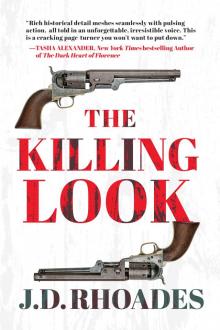 The Killing Look
The Killing Look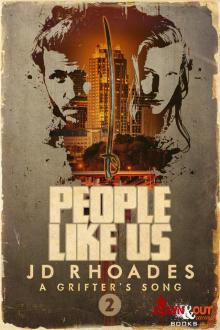 People Like Us
People Like Us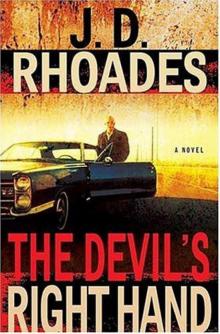 Jack Keller - 01 - The Devil's Right Hand
Jack Keller - 01 - The Devil's Right Hand Safe and Sound
Safe and Sound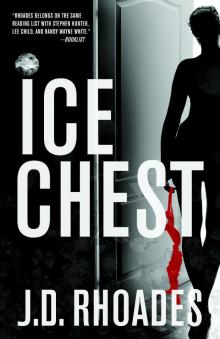 Ice Chest
Ice Chest Breaking Cover
Breaking Cover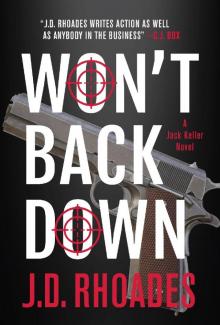 Won't Back Down
Won't Back Down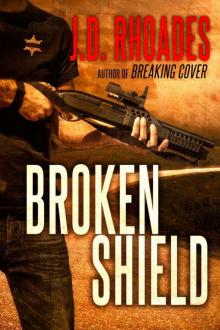 Tony Wolf/Tim Buckthorn - 02 - Broken Shield
Tony Wolf/Tim Buckthorn - 02 - Broken Shield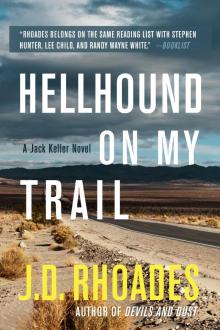 Hellhound On My Trail
Hellhound On My Trail Breaking Cover (Tony Wolf/Tim Buckthorn)
Breaking Cover (Tony Wolf/Tim Buckthorn)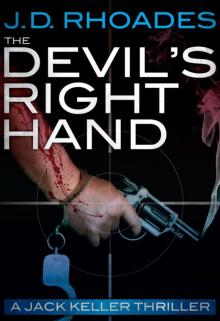 The Devil's Right Hand
The Devil's Right Hand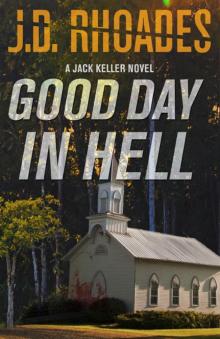 Good Day In Hell
Good Day In Hell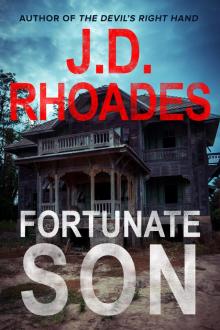 Fortunate Son
Fortunate Son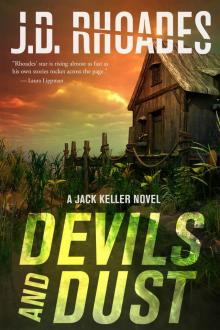 Devils and Dust
Devils and Dust